|
Most of my Spring Semester was consumed researching and writing this. Enjoy... (a PDF can also be found in the Academic Section). Abstract: By reviewing attempts by the Eastern Orthodox Church, the Roman Catholic Church, Evangelical Churches, Protestant Neo-Orthodoxy and the recent contributions of Speech Act theory on divine discourse to reconcile the two forms of the Word of God (The Written Word and the Living Word), this paper aims to address how the gap between mankind and the transcendent God can be bridged to allow for the proper order of metaphysics leading to epistemology without denigrating God’s Word by answering the question: is Christ as the illocution of God the essential link between ontology and epistemology, and thus the starting place for Christian systematic theology?
2 Comments
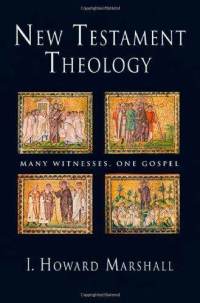 I. Howard Marshall's chapter on Revelation in terms of Dogmas, Doctrines, Distinctives, and Details.* Dogmas. Marshall balances hotly debated topics well and remains firm on the essentials, including God as the primary actor. Christ has “immense significance in the accomplishment of God's purpose for the world and for his people, but always under God” (550). Marshall affirms what he sees as a full Christology, that Christ is the “first and foremost witness and therefore the pattern and inspiration for his followers in the church,” resurrected from the dead, ruler of kings, the recipient of doxological address, and the redeemer/liberator by means of his blood (death on the cross) who will come again (550-551). Christ also receives language reserved for God pointing to his divine nature (561-562). 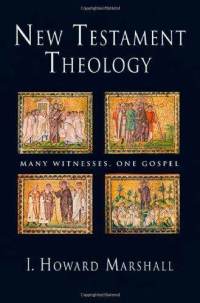 I. Howard Marshall's chapter on John in terms of Dogmas, Doctrines, Distinctives, and Details.* Dogmas. In John, Marshall rightly recognizes Jesus' claim to preexist Abraham and sees support for Christ claiming “parity with God,” but his insistence feels lacking in some areas (502). He accurately captures the main theme as Jesus is the Messiah and Son of God “who came into the world to bear witness to the truth and to give his life so that all people might have the opportunity of receiving eternal life through faith in him” (512). From here, Marshall wonderfully describes seven principal points that impact Christology, being the Logos's: 1) divine eternal nature, 2) responsibility for creation, 3) bringer of light (salvation), 4) rejection by the world, 5) human nature, 6) witnessed by disciples, and 7) the mediator of full blessing (492-493). These are summed up in Christ's role and status, where he is: God's sent one (implying that it is God's will and purpose to save the world), and the founder of salvation (not the “Revealer” so Bultmann or “mythological divine figure” so Ernst Kasemann) (512). The Bultmannian school is cast as only “superficially plausible” and “breaks down under closer inspection” since Salvation goes much deeper, being a “life in relationship with God” (520). This demands that “faith is not only an intellectual acceptance of the message, but also a total commitment of the person to Jesus and to God” since faith is a continuing relationship and not an aorist event (521). 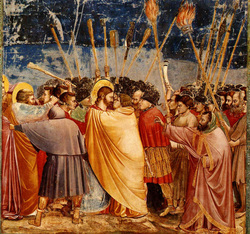 'Kiss of Judas' by Giotto ca. 1304 'Kiss of Judas' by Giotto ca. 1304 Scot McKnight's The Warning Passages of Hebrews: A Formal Analysis and Theological Conclusion article in terms of Dogmas, Doctrines, Distinctives, and Details.* Dogmas. McKnight himself asserts that “virtually all commentators and theologians can agree” that Hebrews promotes perseverance in light of eternal punishment (36). All Christians can affirm that “Perseverance is a necessity for those who are God's people” (32), since, whether or not one can lose their salvation, those who are truly saved persevere in faith. Those who don't persevere are either false believers (unregenerate) or in McKnight's view, “lose their faith” (58). Either way, the result is the same: Persevering faith is key to God's plan. Furthermore, McKnight affirms the orthodox Christian belief for the lack of perseverance, “that those who do not persevere until the end will suffer eternal punishment at the expense of the wrath of God” (36). 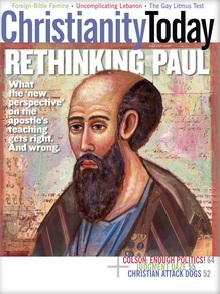 August 2007 Cover Simon Gathercole's What Did Paul Really Mean? article in terms of Dogmas, Doctrines, Distinctives, and Details.* Dogmas. Since the New Perspective focuses narrowly on what Paul says about Justification, which strikes at the heart of Soteriology (the means by which God planned to save mankind), it must be taken seriously. The issue is when the New Perspective is applied to Paul as his dedication “to warning against exclusivist national righteousness” (25) to the destruction of Justification. Gathercole does well critiquing the new perspective while saying that Jews still need to hear the gospel. The crux of his argument is rightfully “Christian faith” not as an add on to life, but something that “requires a complete reorientation of our whole attitude” and “response to God's specific promises” (27). His conclusion describing “what kind of faith” the bible defines and “what is wrong with works of the law” deserves a hearty “amen!” as he stresses that Paul “stresses that God is the sole operator in salvation” (28). Ultimately, he hits the nail on the head by stating that “true unity comes not at the expense of doctrine, but precisely around the central truths of the gospel” (27). 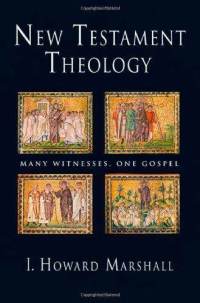 I. Howard Marshall's chapter on Romans in terms of Dogmas, Doctrines, Distinctives, and Details.* Dogmas. Marshall strongly affirms that Paul's main them in Romans in none other than the Gospel of Jesus Christ's ability to save and the subsequent answer to “Why?”. He thus affirms Paul's explanation that all people are sinners since “failure to acknowledge God leads to sinfulness” (308). This is the result of Original sin as revealed by the Law (since its role in salvation history is not a means of getting “right with God by observing the law” (309)). Salvation is portrayed as exclusively available through justification by grace through faith in Christ, whose blood was shed on the cross for sin since “to be justified is to be put into a right relationship with God, in which the sins that persons have committed are no longer counted against them and consequently they can enter into a relationship with God characterized by peace and not wrath” (310). Resurrection is indicated as “an integral part of the saving event and not just simply the restoration of Jesus to life...” after dying for sin (313). Universalism (via postmortem persuasion, etc.) is dismissed as textually unsupported (339).  Escahtological Dualism - Already/Not Yet Don Howell's "Pauline Eschatological Dualism and its Resulting Tensions" in terms of Dogmas, Doctrines, Distinctives, and Details.* Dogmas. Many of the attributes, or defining characteristics, of this present age and new age (regardless of the understanding of their relationship to one another) are Dogma level issues including: sin as a dominating force of the present age as both “human solidarity with Adam” in original sin and sin “as individual acts of rebellion against God's will” which have the inevitable consequence of death physically or spiritually (13); new life as the replacement or removal of the reality of sin as the believer is incorporated into Christ (14). Howell rightly rejects the idea that “Jesus had mistakenly expected or proclaimed the imminence of the Kingdom (5). For any position, such as A. Sweitzer's, that sees Jesus' proclamation as failure not only negates Christ's mission, but also his deity. 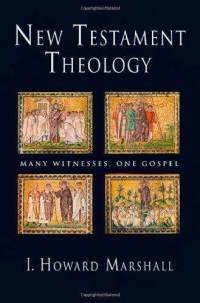 I. Howard Marshall's chapter on Galatians in terms of Dogmas, Doctrines, Distinctives, and Details.* Dogmas. Paul's reason for writing the letter to the Galatians deals with the very heart of the Gospel and thus most of the concepts fall under Dogma. Marshall clearly articulates the Gospel presented in the letter as how “a person could be put right with God or enter into a right relationship with him or be counted as 'righteous' only through believing in Jesus Christ and not by observance of the Jewish law” (215). Furthermore, Marshall promotes that there was one solid understanding of the Gospel as shared by all the Apostles and dismisses theories by Baur that Paul and Peter were rivals with a different understanding of the Gospel (215). He also affirms Paul's separate divine calling that was approved by the Apostles and the church in Jerusalem as a historical event, therefore in acceptance of Christ's theology (214). Hence, it is right to see the purpose of the Law not as an alternative way of life or means of salvation, but “to lead people to Christ by making them realize that they were sinners” (218). Essentials & Non-Essentials: Confidence in the Spirit as Governing Ethos of the Pauline Mission1/8/2013  Don Howell's "Pauline Thought in the History of Interpretation" in terms of Dogmas, Doctrines, Distinctives, and Details.* Dogmas. Howell indirectly affirms the Holy Spirit as the third person of the Trinity and directly asserts the necessary role of the Holy Spirit in a person's salvation through conviction, conversion, sanctification, and wise exercise of Spiritual gifts (214). Doctrines. Howell affirms Roland Allen's assessment that missionaries and church planters often lack “confidence in the Holy Spirit to build the church” (203), but Paul called his converts to rely on the Holy Spirit to live out their faith rather than on his direction (204). Similarly, “he trusted the Spirit to guide the leaders in their oversight of the church” (204), for any church not led by the Holy Spirit is a cult, being led either by man or an alien spirit. 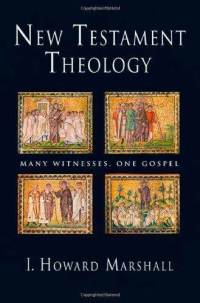 I. Howard Marshall's chapter on Acts in terms of Dogmas, Doctrines, Distinctives, and Details.* Dogmas. Marshall affirms all the central beliefs of Acts, starting with the Gospel message (155), which can only positively be responded to with repentance and faith for the forgiveness of sins (176) “expressed in submission to baptism” (181). The Trinity is emphasized, even though it is not specifically labeled as such (161). Furthermore, the exclusivity of Christ is strongly emphasized, so that not even Judaism is enough (161) stating that “Nobody else or nothing else can save, and no supplementation or prior conditions are needed” (164). Marshall also denies works righteousness, that keeping the Law can't save for salvation is by grace/faith (163). Marshall even touches on the Gospel in light of those who've never heard, stating that God “...has appointed the life of the nations in such a way that people should be able to find him without falling into idolatry” (167). Overview:
An analysis of Christ's Mission in Matthew 16:13-28 will help Christians to examine what influences their theology. There is too much in this passage to cover in 20 minutes, so a narrow focus is drawn from the parallel situation in Christ's day about maintaining a proper perspective and putting priorities straight in light of the Mission of God and the politics of the day. Christians need to ensure that political stances and agendas are the direct result of biblical principles in light of Christ's Mission and not culturally conditioned preconceptions supported with a smattering of proof-texts lifted from random parts of the bible. Preached on election day, 11-06-12.  Apostle Paul by Valentin de Boulogne Don Howell's "Pauline Thought in the History of Interpretation" in terms of Dogmas, Doctrines, Distinctives, and Details.* Dogmas. Howell presents the views of several influential scholars over the past century. Unfortunately, many scholarly interpretations of Paul since the Enlightenment era echo the allegorical hermeneutic of old, subjecting sacred works to a philosophy other than the one presented by the literary meaning of the text. Most of them deny the historicity of biblical accounts and the biblical works themselves, therefore denying the apostolic faith taught in Scripture and by the Church throughout history. The first is Baur, who argued that apostolic Christianity was marked by a radical cleavage between the church of Jerusalem and the churches of the Pauline mission by relegating all biblical books that do not reflect this cleavage to the second century (aka, non-canonical). Orthodoxy is thus a result of the Catholic Church ironing out the kinks. Bousset similarly denies the historicity of the bible, claiming that Paul was influenced by the Gnostics instead of it being the other way around (310). Hunter goes so far as to say that Paul “borrowed his gospel from the people among whom he worked” (310). Howell accurately accounts for these syncretistic claims as not accounting for the whole of Pauline thought (Galatians 1:6-11) and as one missionary analyzing another better explains parallels as contextualization since “linguistic analogy does not necessarily mean conceptual identity” (311). 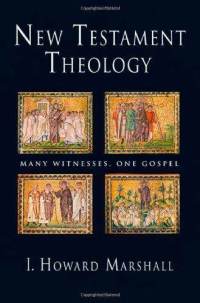 I. Howard Marshall's chapter of Luke in terms of Dogmas, Doctrines, Distinctives, and Details.* Dogmas. Marshall affirms all dogmas key to being “Christian.” The gospel of Christ is central, with repentance and lifelong discipleship to the Trinity as revealed in scripture. He shows that Jesus gave two options: to be or not to be His disciple, the former is costly, but far worse to give up and be the latter (136) and the greatest sin is failure to recognize and respond to God's message (142). While the historical assessment of Luke is postponed (130, 132), the idea that it is “historical fiction” is denounced and Bultmann's existential view is denigrated, positing that the Synoptic Gospels only have force if they are “salvation history” (141, ftnote). However, scripture could be lauded more. The Mission of God is rightly seen as the integrating motif. Marshall bluntly states that Jesus' “mission is summed up as that of the shepherd who goes out to look for and to rescue those who are lost” (138). Marshall even rightly prioritizes eschatological dualism (a Distinctive), questioning Hans Conzelmann's view that the realization of delay led to the church's later motivation to be effective witnesses of the church, instead seeing the early Christians theology as “salvation-historical” right from the start (145). Thus, from the songs of Mary and Zechariah “concerned with God's action for the sake of his people” and “salvation in terms of forgiveness and light” (131) to the passing of the baton at the Great Commission (140), “the character of the career of Jesus is best summed up as mission.” (149). Unfortunately, he seems to allude that this mission was recognized only after the transfiguration (134). Christologically, Jesus is seen as prophet, messiah, and king, with emphasis on prophet (146). Sadly the significance of the “Son of Man” title seems to be downplayed (147), but Marshall sums up Christ's many types and roles as being fulfilled simultaneously in an unimagined reshaping well (149).  Don Howell's "God-Christ Interchange in Paul: Impressive Testimony to the Deity of Christ" in terms of Dogmas, Doctrines, Distinctives, and Details.* Dogmas. Howell addresses the Biblical support within Pauline literature for the affirmation of Christ's deity, and subsequently his role within the Trinity. This is a Dogma level issue because it is crucial to the Gospel message God emplaced as part of his plan for the salvation of mankind. Since the paper largely provides scriptural evidence for orthodox Christology, the entire review could be considered under this category. However, since not all the evidence of Christ's divinity is necessary to proclaim it, the line between Dogma and Doctrine becomes blurred as some (and not always the same), but not all biblical evidence is necessary for God to save (for the sake of this review they will be treated below). Howell presupposes a high view of scripture since it is used almost exclusively to support each of the language-interchange categories presented into Pauline literature. 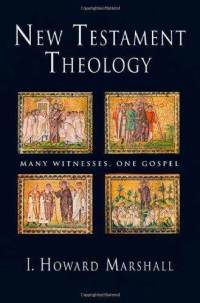 I. Howard Marshall's chapter of Matthew in terms of Dogmas, Doctrines, Distinctives, and Details.* Dogmas. Marshall largely affirms the crucial tenets of Christianity, but often flirts with non-orthodox ideas such as the concept of a “Historical Jesus” (which if seen as an ordinary man deified by history would undermine Salvation). However, Marshall approves of Christ's teaching of God as Father whose “relationship is spiritual rather than being based on creation” (100). He also affirms that Jesus is the Son of God, the Messiah, and third member of the Trinity (113-4) as promised in the Old Testament (116). This orthodox Christology is rounded out with Jesus' deity being pointed to by Jesus as Son in an exclusive relationship with the Father more fully developed in John (103). Marshall also confirms the exclusivity of Christ in stating that the Kingdom of Heaven is the only way (125). Ideas that derail God's plan of salvation, namely that the Great Commission was completed with just Israel in the book of Acts, are mentioned (102), but Marshall seems to tactfully dismiss them.  Wonder where the band's name originated? Craig Blomberg's Degrees of Heavenly Reward in the Kingdom of Heaven? in terms of Dogmas, Doctrines, Distinctives, and Details.* Dogmas. Blomberg does a fabulous job of revealing the dangers that “heavenly rewards” poses to the essentials of Christianity. He not only asserts salvation by faith in Christ alone (159) in this life (172) but also that Heaven will not open for those who “flagrantly repudiate Christ without subsequent repentance” (163). Blomberg rightly warns that the threat is not contingent upon whether one believes in “heavenly rewards,” (165), but that one's profession of faith may prove to be entirely vacuous, thus excluding them from Heaven because they thought that the lack of fruit in their lives indicated the absence of future rewards, not the absence of their salvation (172). “Saving faith does over time lead to a visible transformation in lifestyle and to growth in holiness” (172) for a tree is recognized by its fruit! The “prosperity gospel” is a false gospel, for health and wealth supplant Christ crucified. 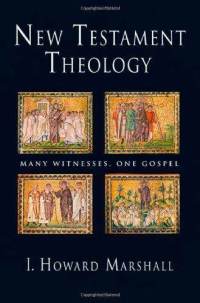 I. Howard Marshall's chapter of Mark in terms of Dogmas, Doctrines, Distinctives, and Details.* Dogmas. Although Marshall values Higher Criticism, he denounces the idea that the gospels are a random spattering of stories collected from Jesus' life and ministry strung together as each gospel writer attempted in vain to recall the exact ordering of events. Instead, he points out why each gospel is different (ex. available space to record, limited access to all information, and authorial situational context). So while Marshall may not hold to inerrancy, he still values scripture's authority by accounting for differences as each author promoting a theological message and desired response.  Psalm 139:7-12 (ESV) - Where shall I go from your Spirit? Or where shall I flee from your presence? If I ascend to heaven, you are there! If I make my bed in Sheol, you are there! If I take the wings of the morning and dwell in the uttermost parts of the sea, even there your hand shall lead me, and your right hand shall hold me. If I say, "Surely the darkness shall cover me, and the light about me be night," even the darkness is not dark to you; the night is bright as the day, for darkness is as light with you.  Azariah prompts Asa's reforms, Bible Historiale 2 Chronicles 15:1-2 (ESV) “The Spirit of God came upon Azariah the son of Oded, and he went out to meet Asa and said to him, 'Hear me, Asa, and all Judah and Benjamin: The LORD is with you while you are with him. If you seek him, he will be found by you, but if you forsake him, he will forsake you.'” 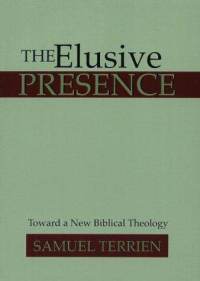 Excerpt of Covenant sections Terrien points to the differences in interpretation, worldview, and religion between Judaism and Christianity to state that the term “biblical” is ambiguous (22)1. To support this claim, he shows that national Israel herself had a diverse response to her own divine history, instead of a homogeneous understanding of the Hebrew covenant, by claiming that each new covenant in the Old Testament was a mythical re-envisioning of God's prerogatives based on outside cultural influences. Further, Terrien claims that most Hebrews did not think in terms of Covenant since the term is absent from many of the Old Testament books.  from "The Tabernacle Experience" Exodus 40:1-7. “The LORD spoke to Moses, saying, 'On the first day of the first month you shall erect the tabernacle of the tent of meeting. And you shall put in it the ark of the testimony, and you shall screen the ark with the veil.' 34-36 Then the cloud covered the tent of meeting, and the glory of the LORD filled the tabernacle. And Moses was not able to enter the tent of meeting because the cloud settled on it, and the glory of the LORD filled the tabernacle. Throughout all their journeys, whenever the cloud was taken up from over the tabernacle, the people of Israel would set out.”  “The Kingdom of God” has fallen out of favor amongst modern scholars as the primary or sole theme of the Old Testament. However, Patrick still sees the Kingdom of God theme as a valid solo theme. He opens by disagreeing with the argumentation that the Kingdom theme should displaced by, or combined with, other themes simply because the exact phrase “Kingdom of God” has minimal usage within the Old Testament. Instead, Patrick argues that the idea of the Kingdom of God clearly pervades the Scriptures despite the lack of the term itself. To make his argument that the Kingdom of God should remain as the primary theme, Patrick points to the teachings of Jesus' in the NT, stating that this should raise the Kingdom theme to the level of a heuristic and that the antecedents of this heuristic can be clearly traced to the Old Testament.  Isaiah 6:1 (ESV) In the year that King Uzziah died I saw the Lord sitting upon a throne, high and lifted up; and the train of his robe filled the temple. (6:4) And the foundations of the thresholds shook at the voice of him who called, and the house was filled with smoke. (6:5) And I said: "Woe is me! For I am lost; for I am a man of unclean lips, and I dwell in the midst of a people of unclean lips; for my eyes have seen the King, the LORD of hosts!" (6:8) And I heard the voice of the Lord saying, "Whom shall I send, and who will go for us?" Then I said, "Here I am! Send me." 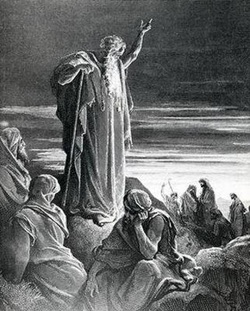 Ezekiel's Preaching - Gustav Dore In warfare during the Ancient Near East (ANE), warring states typically also meant warring religions due to local gods and tribal deities. Thus, the victory of a certain people was often translated into the victory of their god over the vanquished people's god as well. With this background in mind, Luc argues that Ezekiel did not see the impending Babylonian exile as a political problem, but a theological problem. Ezekiel was concerned first and foremost with God's name and that Israel's history resulted from God's concern for His own name. Luc demonstrates that Israel only survived many bouts of apostasy because God withheld His wrath “for the sake of my name” and “...to keep his name from being profaned 'in the yes of the nations'” (Luc, 138). |
AuthorBrett Yardley: Categories
All
Archives
January 2019
|


